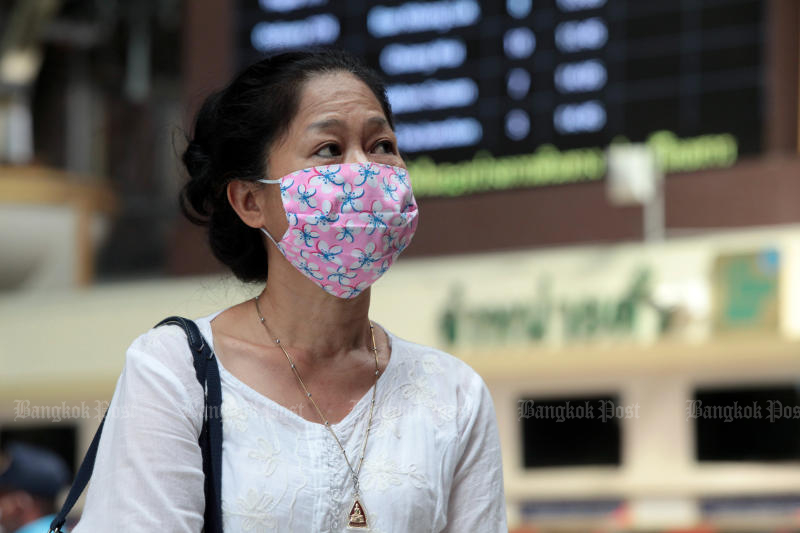
Thai stocks posted their steepest slide since 2006, extending losses as trading resumed following a halt triggered by a circuit breaker when losses reached 10%.
The Stock Exchange of Thailand index tumbled as much as 12%, the most since December 2006, when regulators imposed and then rescinded currency controls on investors. Thursday’s plunge was the biggest among major regional equity gauges, along with the Philippine gauge, which slumped 10% before trading was suspended.
The index ended 134.98 lower, or 10.8%, to close the day at 1,114.91 in heavy turnover of 101 billion baht. Institutional investors led the sell-off, with a net 4.6 billion baht, followed by brokers at 4.07 billion baht and foreign investors at 1.9 billion baht. Small investors bought a net 10 billion baht.
The trading circuit breaker was triggered as the index fell by 10% when the afternoon session resumed.
“The market is reacting now more to the fear of global investors,” said Win Phrompaet, a fund manager at Principal Asset Management. “This may be a time to start buying, the market has reacted too much.”
The Public Health Ministry said on Thursday that confirmed cases of the disease known as Covid-19 jumped by 11 to 70, the biggest increase in recent days.
Separately, a gauge of consumer confidence for February fell to its lowest level since April 1999 as the virus, a delay in the annual government budget and a drought eroded sentiment, according to the University of the Thai Chamber of Commerce.
Thailand has buckled under a collapse in tourism, a sector that accounts for about one-fifth of gross domestic product. The government this week approved a package of stimulus measures that it said will inject about 400 billion baht to counter the blow from the coronavirus outbreak.
The Finance Ministry and stock exchange officials are working on a fund to be set up to shore up the stock market, Deputy Prime Minister Somkid Jatusripitak said, adding that it was not as easy to establish such a vehicle as in past years because the market came under pressure.
Elsewhere in the region, the stock markets went from bad to worse. After most gauges tumbled into bear territory in the last few weeks, now the plunge is triggering trading halts.
Like Thailand, the circuit breaker was also triggered in the Philippines after the benchmark gauges of both countries slumped 10%, the most in Asia.
Indonesia, where the stock exchange just tightened its rules, also suspended trading as the Jakarta Composite Index fell 5%.
Both the SET Index and the Philippine Stock Exchange Index tanked the most since October 2008, as foreign investors liquidated their equity holdings fast in a region heavily reliant on tourism and with open capital accounts.
Stocks in the region tanked as foreign investors liquidate their equity holdings on concern the virus will disproportionately hurt markets that are heavily reliant on tourism and with open capital accounts. Even though the circumstances are different this time, it’s reminding some investors of the Asian financial crisis.
“The markets in the last few days, even the winners have sold off,” said Kerry Goh, chief investment officer at Kamet Capital Partners Pte. “In 1998, Southeast Asia was down a lot more but it was the epicentre. This time, we’re being dragged down by the rest of the world.”
Southeast Asian equities are now trading near their lowest in 14 years relative to global developed peers. The MSCI Asean Index’s valuation of 14.5 times estimated earnings for the next year is now below 2-standard deviations of its 10-year average, data compiled by Bloomberg show.
Currencies there were also hit hard. The Indonesian rupiah led a decline, plunging 1% against the US dollar, while the Philippine peso and the baht dropped more than 0.7%. The baht and the rupiah are the two worst-performing currencies this year in Asia. Indonesia has also seen global funds dump $2.8 billion of its debt.
All six of Southeast Asia’s biggest economies count China as their top trading partner, which doesn’t help. The lack of tourists from China has dealt a blow to those economies.
Among the Southeast Asian countries, Indonesia has been the most proactive in providing stimulus to curb asset price declines. It has eased buyback rules, imposed trading limits and put a short-selling ban in place, while its central bank has cut reserve ratios and signaled more measures to stem a rout in the rupiah and bonds.
Still, some investors have been slashing positions in emerging-markets equities, including UBS Global Wealth Management. “From here we are less confident in emerging markets’ relative outperformance and so we have reduced the size of our overweight position,” global chief investment officer Mark Haefele wrote in a note on Wednesday.
“We can expect continuing volatility,” said Mark Mobius, the veteran emerging-markets investor. “We are nearing the bottom, but no one can specifically point to a bottom. When there is great uncertainty, fear increases. Fear in turn results in retreat.”